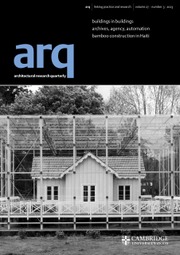Article contents
Building Science: Synthetic Biology and emerging technologies in architectural research
Published online by Cambridge University Press: 20 July 2016
Extract
The paper examines the concept of Building Science through the role of emerging scientific research and technologies. The paper takes as its starting point the Technology Readiness Strategy which is a way of judging the state of a technology in terms of its readiness for environmental deployment and relevance to industry. The paper argues that this model is limited and uses the example of Synthetic Biology to argue for a type of building science which is both speculative and grounded and which may not lead to immediate or short-term applications but is driven by hypothetical contexts and imagined futures. The paper argues that both scientific knowledge and architectural research may be enhanced through deeper collaboration and gives the example of a project to develop a genetically engineered mechanical sensing bacteria capable of making materials which respond to physical forces in their environment. The paper suggests that, while initiated with an application domain in mind, the knowledge gained from the project has pointed to alternative avenues for creative design explorations. The paper concludes that an alternative form of Building Science may be possible in which the term ‘building’ is both a verb and a noun.
- Type
- Perspective
- Information
- Copyright
- Copyright © Cambridge University Press 2016
- 1
- Cited by


